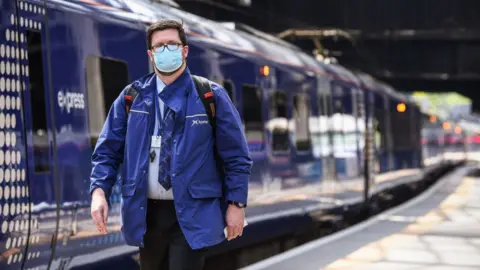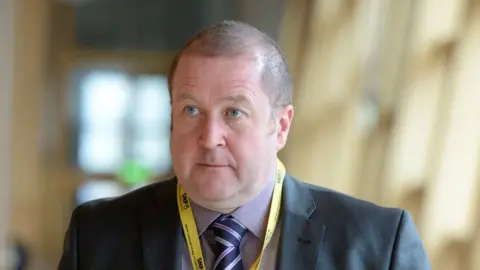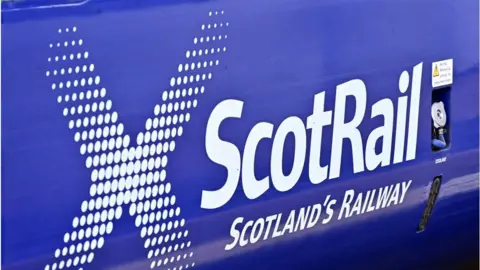COP26: Minister 'not optimistic' of avoiding rail strike
 Getty Images
Getty ImagesScotland's transport minister has said he is "not optimistic" a rail strike during COP26 will be avoided.
Graeme Dey accused the RMT union of moving the goalposts during negotiations aimed at avoiding industrial action by ScotRail staff.
He said contingency plans were being made to keep the trains running but warned of extensive disruption.
ScotRail and the government has set an arbitrary deadline of 17:00 on Wednesday for the offer to be accepted.
Three other unions representing rail workers - Unite, Aslef and TSSA - have accepted a pay deal which is worth 4.7% over two years and includes a £300 bonus for working during the summit.
The Scottish government has said the offer remains on the table but the union has described the deadline as like "having a gun pointed at our head".
ScotRail said it was necessary to allow contingency plans, which will see suitably-trained supervisors and managers replace striking staff, to be finalised.
The operator said its focus would be on connecting Glasgow and Edinburgh and on providing key routes through Glasgow but it would not be drawn on the frequency of services or their period of operation.
 Getty Images
Getty ImagesAsked on BBC Radio's Good Morning Scotland programme if he thought a strike would be avoided, the transport minister said "the signs are not optimistic".
He added: "The RMT along with the other trade unions were made an offer several weeks ago and it took them two weeks to come back to ScotRail and give us a formal decision on whether or not they were accepting it.
"In the subsequent period we've tried to reach an agreement and time and time again the goalposts have been moved.
"This is not about a gun being held to anybody's head. We are less than a week away from COP and we need to know where we stand."
Mr Dey said there were contingency plans to keep some train services running during the UN climate change summit.
"Considerable amount of effort has gone in to deliver the best possible train service that we can in the circumstances. I'm not going to mislead the public and suggest it will rival the current level of service," he said.
"There will be disruption. It won't just affect COP26 - it will affect the wider travelling public. It will be extensive - there is no doubt about that but we are working flat out to try and ensure that as many trains as possible are running."

How bad could the impact of the strike be?
Analysis by Andrew Picken
 Getty Images
Getty Images"Decimated" is the word used by ScotRail officials when describing service levels if the planned industrial action goes ahead.
RMT members in ScotRail are mainly conductors and ticket examiners and, unlike in other countries, without them the majority of train services in Scotland do not operate.
This would include the flagship express route between Edinburgh and Glasgow as well as ScotRail's InterCity services.
Contingency planning for the strike is under way, but it is likely the level of service would not even match the limited offering there has been on Sundays since March where separate strike action has been taking place.
If there is no resolution by Wednesday's deadline, ScotRail will spend the rest of the week training workers from other parts of its business to take on some of the duties, such as staffing ticket barriers.
Three other trade unions which represent ScotRail staff, including train driver union Aslef, have accepted the pay rise on offer and this increase has been put in place for them and non-unionised ScotRail workers.

RMT regional organiser in Scotland Mick Hogg said the transport minister's comments were "nonsense" and claimed the union had been "stonewalled" for months.
He said while there had been movement over a separate issue of rest day working, there had been no progress on pay and proposed efficiency savings.
"What that means is there are going to be booking office closures, job losses and station closures - and a denial for the most vulnerable people in society to get access to Scotland's trains," he said.
Mr Hogg later told the BBC the RMT was pressing for a one-year pay deal of about 4.9% which was not linked to efficiency savings. The current offer is for 2.5% this year and 2.2% in 2022.
'Very strong offer'
ScotRail operations director David Simpson defended the current offer, especially as passenger numbers have plummeted due to Covid.
He told BBC Scotland: "It reflects very clearly the financial position the industry is in post pandemic."
Mr Simpson added that he could not understand why Mr Hogg had not put the deal to his members.
On the impact of a strike as the eyes of the world are on Glasgow, he said: "I think everybody wants to make sure COP is successful and rail is to play its part in that but we can't just throw money at that without consequences. There is a very strong offer on the table."
As the deadline looms, he added: "We hope the strike can be resolved but on the basis of the RMT's current position it is very wise and prudent to be making these contingency plans in case it goes ahead."
COP26 runs from Sunday 31 October to Friday 12 November, with 120 world leaders and more than 30,000 visitors are expected in Glasgow.
 EPA
EPAThe RMT is threatening strike action from 1 November, for the duration of the summit.
A separate dispute could see thousands of council workers across Scotland including refuse, recycling, maintenance and school catering and janitorial staff taking strike action during the second week of the climate talks.
Scottish Conservative leader Douglas Ross said the Scottish ministers should have acted earlier to resolve the disputes.
"These unions are exploiting COP26 to their advantage and I think that's absolutely wrong," he said.
"But fundamentally the Scottish government have been found wanting, they've stood on the sidelines, done nothing about this until the last minute which is why there's potential for absolute chaos because the SNP Scottish government and Glasgow City Council haven't dealt with these issues soon enough."
'Real terms pay cut'
Labour's shadow Scottish secretary Ian Murray said setting a deadline for the RMT to accept the offer was not the way to resolve the rail dispute.
"The derisory offer, that I think is of 2.2% - less than what inflation is currently running at - is a pay cut in real terms for people who kept the railways running during Covid," he said.
He said the dispute with council workers was an example of cuts "coming home to roost" after a decade of underinvestment in council services.
The Scottish Liberal Democrats said the transport minister should resign if the dispute was not resolved by the start of the "most important climate summit of all time".
Transport spokeswoman Jill Reilly said: "If the trains don't run smoothly and on time for the duration of COP26, then Graeme Dey should resign.
"The eyes of the world will soon be on Scotland. Ministers need to stop grandstanding and hammer out a deal that gets the trains running."
